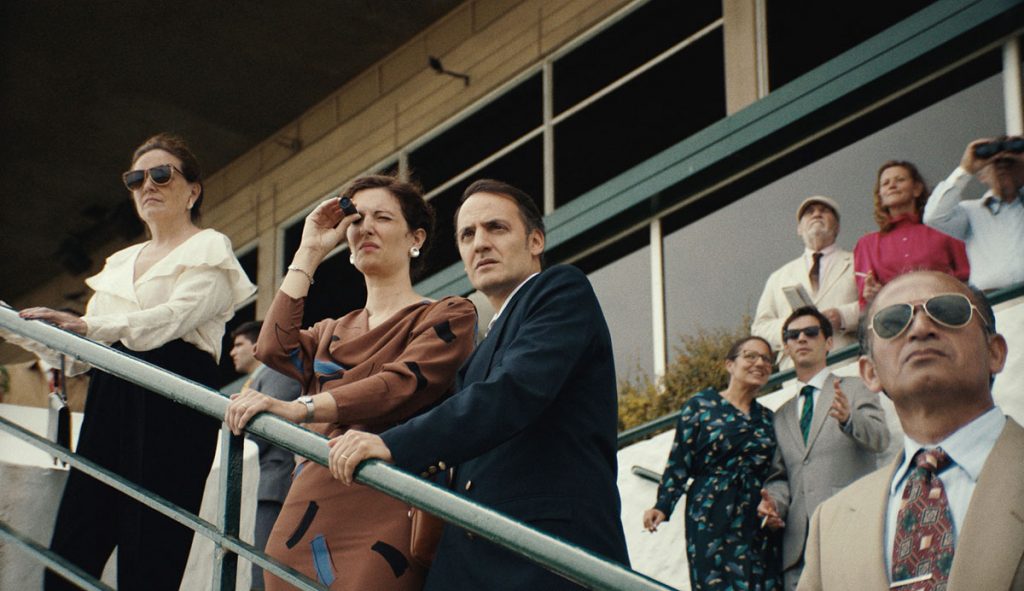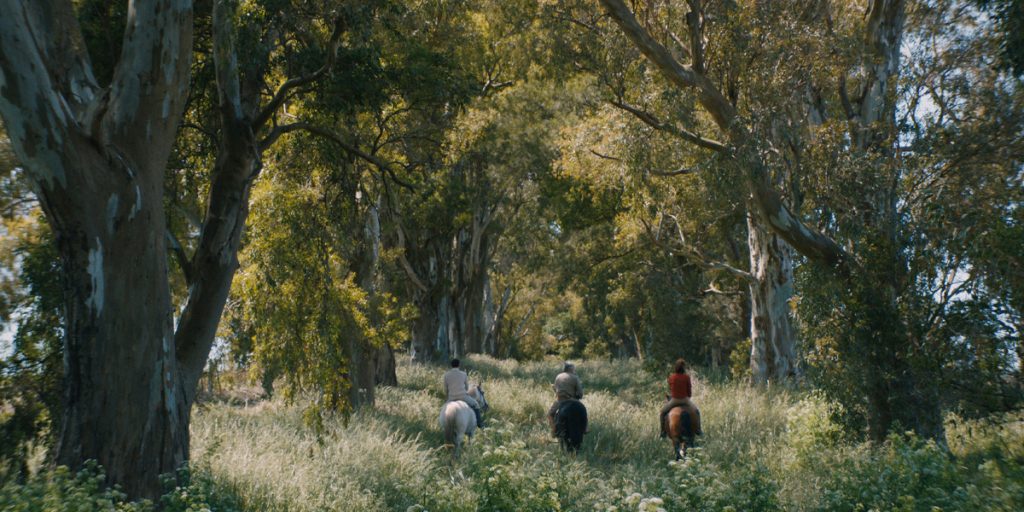Taking us on an intimate journey into the shady backroom deals of private banking, Azor crafts a beguiling mystery that its restrained filmmaking never quite realizes.
“We also say, to Condois,” Inés (Stéphanie Cléau) tells Viuda (Carmen Iriondo), another bored wife at a bankers’ gala, as she shares the “limited dialect” of private bankers. “My husband does it very easily. It means to pretend you haven’t seen anything.” Inés shares another—“When someone cannot be trusted, we say that he has deux jaunes.” And another one—“And…Azor…be quiet. Careful what you say.”
The year is 1980 and a Swiss private banker named Keys has disappeared in Argentina. His partner Yvan de Wiel (Fabrizio Rongione) travels to Buenos Aires with his wife Inés to find him, and during their trip he also checks in on Keys’ clients to reassure them that Keys’ disappearance won’t affect their affairs. During Yvan’s visits, he meets an eclectic cast of rich and powerful clients that range from members of the upper class to powerful businessmen to even a Monsignor (Pablo Torre Nilson). Following a trail of clues that leads him to information about Keys’ activities, he discovers a client named “Lázaro” who isn’t mentioned in his own list of accounts. Continuing his search while schmoozing among his wealthy clients, he soon discovers what happened to Keys as he discovers a sinister secret with grave implications.
Having lived in both Switzerland and Argentina, writer and director Andreas Fontana drew upon personal cultural experience to craft his feature debut Azor. Additionally, Fontana’s grandfather worked as a Swiss private banker, so his familiarity with the secrecy and mystery surrounding this industry is evident in the film’s smaller details. In one scene, a man tells Yvan about a Swiss banker he met in Buenos Aires, but another man steps in to tell him that’s offending Yvan by comparing commercial banking to private banking. “It’s like comparing an airliner to a private jet,” he says.
Discussions of secretly moving large amounts of money are portrayed as quiet conversations in upstairs bedrooms and offices, hidden away as nervous elites mask concern for their precious wealth. There’s a certain sense of mundanity to these conversations—it’s almost like we expect these sinister elites to be more menacing, more theatrical—but no, these shady figures, members of the Argentinian upper class or Church, keep a low profile and keep their money even quieter.

Taking a slow descent into dark and dangerous depths, Azor also draws inspiration from “Heart of Darkness”, which is especially visible in a scene where Yvan takes a precarious cruise down a river through the jungle, unsure of where he’s heading next. There’s a deep current of fear running through Azor—fear of the terror of the Argentinian military junta, fear of forced “disappearances,” and the wealthy banking clients’ worries about the safety of their riches. There’s a quiet anxiety that pervades the film, giving it its strongest sense of mood where the other sensory details aren’t as apparent, and the most important details aren’t found in what is spoken or what is seen, but instead in what is left spoken and unseen. To best appreciate Azor, it’s wise to enter not expecting anything bold or thrilling, and instead to let its mystery sneak up on you, grab hold, and pull you inside.
Apart from the mystery of Keys’ disappearance and Yvan’s search for him, there isn’t anything in the film that’s particularly engaging. None of the characters are given much personality or memorable traits—even Yvan is almost as much a mystery as his missing partner Keys. We never get a true sense of his character and motivations, and he almost seems to be a passive actor in his own story. For many viewers that aren’t familiar with the history of Argentina’s coup and military junta in the 1970s and 1980s, it’s difficult to grasp the true dimensions of the story and its setting since the film doesn’t give much context.
Azor is a quiet film in its craft too, and apart from a brief strobe light sequence during a party, there’s nothing that visually stands out. The camera doesn’t move very often and we don’t even get a visual sense of perspective and place to be immersed into since the world onscreen feels two-dimensional. Ultimately, Azor feels like the kind of film whose vague premise might catch your attention at a festival, but won’t leave you any desire to revisit it or even give it much thought afterwards. Its cryptic storytelling and subdued filmmaking don’t offer anything that particularly stands out and by the end, the film leaves you wishing it had something more to offer inside its cold, methodical core.
Azor was released in US theaters on September 10 and in UK cinemas on October 29, 2021.

